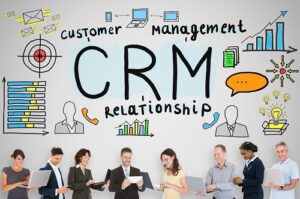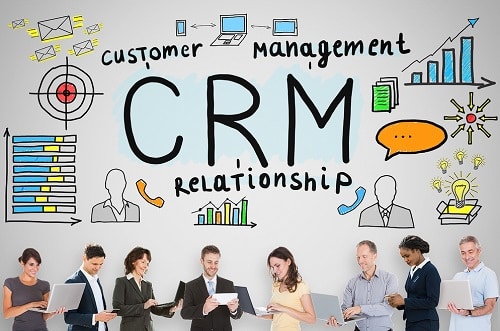Introduction to CRM for B2B
Customer relationship management (CRM) software has become an essential tool for businesses to manage their customer relationships, streamline their sales process, and ultimately drive revenue. While many associate CRM with B2C (business-to-consumer) sales, it has become increasingly vital in B2B (business-to-business) environments as well.
In a B2B context, CRM helps businesses manage relationships with other companies, suppliers, and partners. It enables them to track interactions, identify opportunities, and maintain a comprehensive view of their accounts. This article will explore the importance of CRM in B2B account management and sales, as well as offer guidance on selecting the right CRM solution and implementing it effectively.
The Importance of CRM in Account Management
In B2B sales, account management plays a critical role in nurturing long-term relationships and maximizing customer lifetime value. CRM systems help businesses achieve these objectives by providing a centralized platform for storing and accessing account information, tracking communication history, and managing tasks and opportunities.
Some key benefits of using a CRM for B2B account management include:
- Improved collaboration among sales teams, ensuring everyone is on the same page
- Enhanced ability to segment and target accounts based on their needs and behaviors
- More accurate sales forecasting and reporting
- Streamlined sales processes, reducing the time to close deals
Key Features of B2B CRM Solutions
B2B CRM solutions differ from B2C solutions in several key areas, with features designed to accommodate the unique needs of business-to-business sales. Some essential features of a B2B CRM include:
- Account-based management: Allows sales teams to manage and track entire accounts, rather than individual contacts
- Customizable sales pipelines: Enables businesses to create pipelines tailored to their specific sales processes
- Contract management: Provides tools to create, manage, and store contracts and agreements
- Integration with marketing automation platforms: Facilitates seamless communication between sales and marketing teams
Selecting the Right CRM for Your B2B Business
When choosing a CRM solution for your B2B business, consider the following factors:
- Scalability: Ensure that the CRM can grow with your business and handle increasing data and user requirements
- Customizability: Look for a CRM that allows you to tailor its features and interface to your unique business processes and needs
- Ease of use: Select a CRM with an intuitive interface that your team can easily adopt and use effectively
- Integration capabilities: Make sure the CRM can integrate with your existing systems, such as email, calendar, and marketing automation tools
Integrating CRM with Existing Systems
Seamless integration between your CRM and existing systems is crucial to maximizing its value. Look for CRM solutions that offer native integrations or use API connectors to link the CRM with your other tools. Some common integrations include:
- Email and calendar: Sync your CRM with your email and calendar tools to streamline communication and scheduling
- Marketing automation: Connect your CRM to your marketing automation platform to ensure a seamless flow of data and insights between the two systems
- ERP and accounting: Link your CRM with your enterprise resource planning (ERP) and accounting systems for better financial and operational visibility
Best Practices for Implementing B2B CRM
Successful CRM implementation requires thoughtful planning and execution. Here are some best practices to follow when implementing a B2B CRM:
- Set clear objectives: Define your goals and desired outcomes from the CRM, such as improved account management, increased sales efficiency, or enhanced collaboration among teams.
- Involve key stakeholders: Engage sales, marketing, and other relevant departments in the decision-making process to ensure buy-in and support.
- Train your team: Provide comprehensive training to ensure that all users understand how to use the CRM effectively and are aware of its benefits.
- Start with a pilot project: Begin with a small-scale pilot project to test the CRM and gather feedback before rolling it out across the entire organization.
- Monitor and refine: Regularly review the CRM’s performance and make adjustments as needed to ensure it continues to deliver value and meet your business objectives.
Measuring CRM Success and ROI
To assess the success of your CRM implementation and its impact on your business, consider tracking the following metrics:
- Sales revenue: Monitor changes in sales revenue before and after implementing the CRM to gauge its impact on your bottom line.
- Sales cycle length: Evaluate whether the CRM has helped shorten the sales cycle by streamlining processes and improving account management.
- Customer retention rate: Assess if the CRM has contributed to improved customer retention by enabling more proactive and targeted account management.
- User adoption rate: Monitor the percentage of your sales team actively using the CRM to gauge its effectiveness and acceptance within the organization.
FAQs on B2B CRM
Q: How does a B2B CRM differ from a B2C CRM?
A: B2B CRM solutions are designed specifically to address the unique needs and challenges of business-to-business sales, such as managing complex accounts, handling longer sales cycles, and dealing with multiple decision-makers within an organization.
Q: Can a B2B CRM integrate with other business systems?
A: Yes, most B2B CRM solutions offer integrations with a wide range of business systems, including email, calendar, marketing automation, ERP, and accounting tools. This helps streamline processes and improve data visibility across the organization.
Q: How can I ensure my sales team adopts the CRM?
A: To encourage CRM adoption among your sales team, provide comprehensive training, demonstrate the benefits of using the CRM, and offer ongoing support and resources. Additionally, choose a CRM with an intuitive interface and customizable features to make it easier for your team to use effectively.
Q: How much does a B2B CRM cost?
A: The cost of a B2B CRM can vary widely depending on factors such as the number of users, the level of customization, and the specific features required. Some CRM providers offer tiered pricing plans or per-user pricing, while others may charge a flat fee for a certain number of users. It’s essential to carefully evaluate your business’s needs and budget before selecting a CRM solution.

